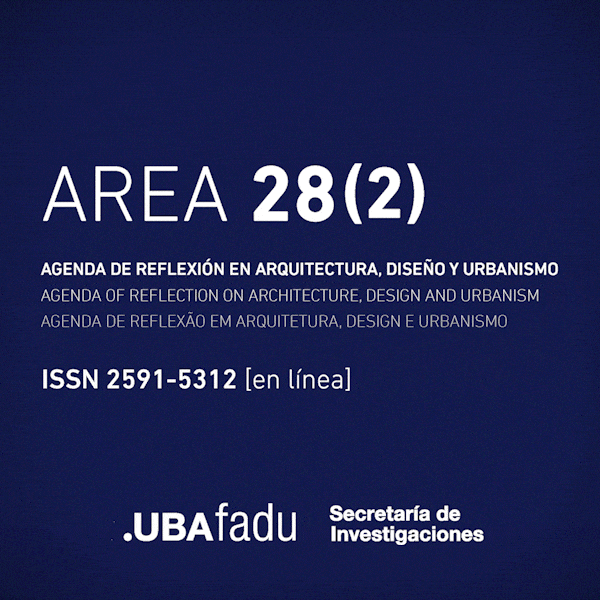
MAY 2022 / OCTOBER 2022
Director: Dra. Arq. Rita Laura Molinos
Editor: Dra. María Ledesma
Coeditor: DG. Miguel A. Santángelo
Technical editor: DG. Emiliano M. Eseiza
© The contents and metadata of this magazine are licensed under Open Access CC BY-NC-ND 2.5 AR
DNDA registration of the digital edition in process

Contents
General thematic articles
Bases for a creative process model of sustainable architecture
Irene Blasco Lucas
Abstract
Investigations realized to reveal the incorporation of building sustainability criteria in the creative process of the architectural work are summarized, trying to create a model that serves as a basis to generate discussions or modifications by other views. Its elaboration is carried out from the analysis of theories held by numerous authors on the fundamental concepts that characterize creativity and sustainability in Architecture, as well as the construction of process models adapted to this profession. The scheme is made up of a flow chart with recursive loops between the phases highlighting the specific aspects of Sustainable Architecture.
Architecture and cultural identity in peru. The symbolic universe in the encounter of the authentic and the appropriate during the 20th century
César Castañeda Silva
Abstract
The identity in Peru from the architecture propitiated during the 20th century, focused on the strengthening of the particular as a way of resistance and syncretism in the face of persistent cultural dependency, developing timeless imitations and incipient formalisms that would not provoke a rethinking of the theme around the social, political, and cultural, showing unstable moments of contingency and vitality. However, delving into a series of buildings and discourses, it is possible to form a path that, from unity, promotes the constitution of a symbolic universe in the encounter of the authentic and the appropriate.
New technologies of prefabricated building in depressed habitat. Socioeconomic and thermal analysis for the city of Mendoza
Julieta Balter y Virginia Miranda Gassull
Abstract
This work studies the possibilities of access to alternative construction technologies for envelope systems. The offer available in the local market (Mendoza Metropolitan Area) is analyzed from the economic, socio-territorial, and thermal-energy dimensions. The results show that the prefabricated systems offered in the province are difficult for low-income families to access economically. However, advantages were identified regarding the handling facilities of various subjects related to the ability to make the components of these systems independent and the low level of technology in panel assembly. Likewise, due to the good interior thermal performance of the evaluated systems, it is considered possible to adapt these technologies to depressed habitat areas, in order to guarantee better habitability conditions to the sectors that can least afford the energy costs for air conditioning.
Approaches on the construction and appropriation of knowledge in architecture
Lucas Federico Tebes
Abstract
In this article we will approach teaching systems in architecture, understanding that historically they were developed through a device made up of “Master-Disciple”, from which, the master within a formative process not necessarily academic, introduces the disciple to the knowledge and profession of, in this case, architecture. We will analyse how the systems of “didactic transposition”, “practicum” and “learning by doing” work. Understanding that these methods of approach from “experience” to the construction of “knowledge”, defined by the master, condition the project process of the disciple, manifesting a consolidation and reproduction of the “Master-Disciple” device.
Design strategies to define thermal comfort in classrooms in a warm climate
Olga Lucía Montoya Flórez y Gustavo Alberto San Juan
Abstract
This work presents some recommendations for the design of thermally comfortable school classrooms in the tropics. These recommendations are validated from a specific study developed in schools in Cali, Colombia. The conceptual contribution of various authors is exposed; the application of an analytical-empirical methodology, the User Perception Environmental Audit-AAPU technique (from Spanish Auditoria Ambiental de Percepción del Usuario) was applied for the analysis of real situation. For the verification of thermal performance was used tools in transitory state. The main results are low correspondence between the standardized thermal comfort models and the situation measured, that expressed by the students and that simulated. In addition to the final reflection on the need to incorporate bioclimatic strategies from the beginning of the design process, to provide the best building conditions.
Comparative analysis of three earth building systems. Embodied energy and C02 emissions
Alleck J. González Calderón
Abstract
Due to building with earth, has proven to be sustainable, in a context of climate change, it has been reinterpreted traditional techniques like to adobe and bajareque, for their application in contemporary systems. The objective of this paper is to present a comparative analysis of embedded energy and CO2 emissions, to determine the sustainability of three construction systems with earth: adobe and blocks earth compressed, against a prototype named Technified Bajareque, built at the Autonomous University of Coahuila in Torreón, Mexico. The methodology contemplates quantification of materials, as well as the assignment of volumetric weights and coefficients of embedded energy and CO2 emissions. Based on the results, the ecological qualities of the Technified Bajareque are demonstrated, to be considered a sustainable construction system.
Bases for a systemic consideration of architectural design
Avatar Flores Gutiérrez
Abstract
Architectural design maintains an ambiguity on essential questions regarding its nature, related to a lack of definition about objectivity or subjectivity in project activity. This is sustained mainly by the holistic nature of the human habitat. From the emergence of theories of systems, the possibility arises for articulating apparently opposing views. However, the use of systems in architecture has focused fundamentally on the description of the living experience and not in terms of architectural design as activity. Based on the description of systems by Gustavo Bueno and David Alvargonzález, this article proposes that the notion of the systematiser opens up the possibility of identifying and articulating the bases, their components and relationships that allow a systemic and configurational consideration of architectural design. In this way, the article builds the definition of an architectural design system from the given determinants, with arguments from environmental psychology, the notion of a common goal and the premise of a complex vital system.
Two decades of argentine housing policy: factual neo-developmentalism and institutional frameworks for agreements
María Beatriz Rodulfo y Teresa Boselli
Abstract
The leading role of housing policy in Argentina, linked to public works, mobilizing the economy, and generating employment, is expressed through the production of social housing and socio-territorial infrastructure. This work aims to analyse the housing policies of our country in the first two decades of the XXI century and the effects on the territory from a quantitative and qualitative approach. The period indicated differentiates two sub-periods according to the management models implemented, which are markedly opposed to each other.
Human spatial needs at different scales of architecture, urbanism and landscaping, in the context of COVID-19
Fernanda Machado Dill, Maíra Longhinotti Felippe, Angela Favaretto, Vanessa Goulart Dorneles, Raphaela Walger Da Fonseca y Amanda Silveira Correa
Abstract
The COVID-19 pandemic imposed new living conditions, social isolation, hygiene measures among others on the population. Thus, it is questioned what new perspectives and directions our cities and projects will have in the future. A research was developed to analyse the perception of users in Brazil regarding their routines and expectations during the period of confinement between May and June 2020. The research consisted of the elaboration of an online questionnaire and the 1858 responses collected brought reflections on the changes that occurred during this period, on the satisfaction of people with their own homes, with their cities and their neighbourhoods.
Review
The radical form of the metaphor
Laura A. Iribarren
